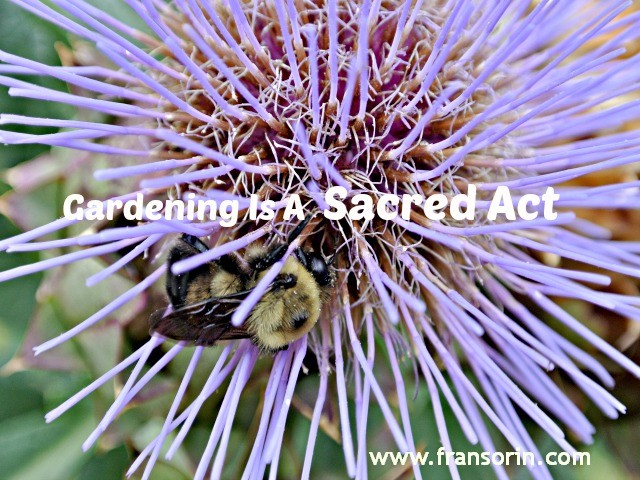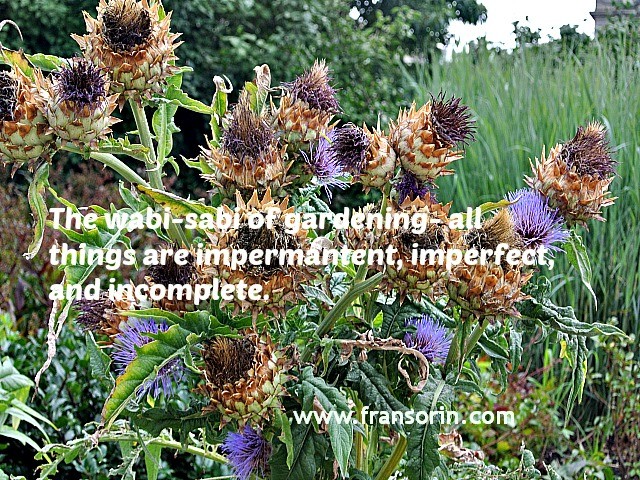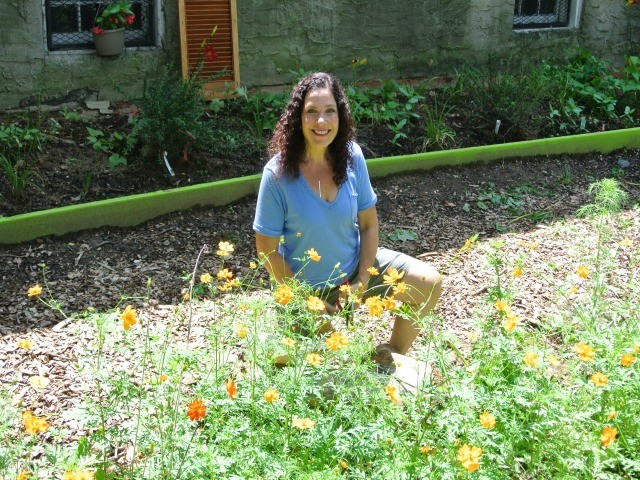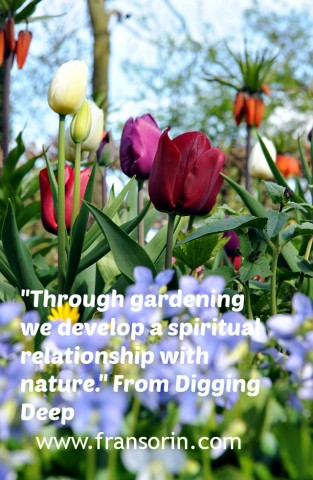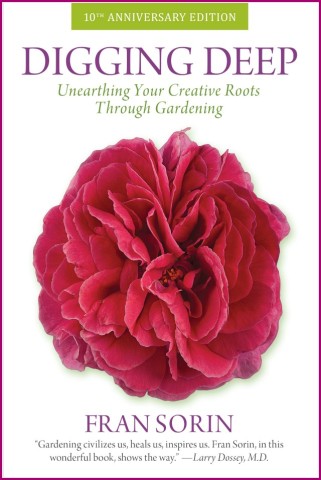When you dig a hole in the ground, and feel the soil in the palm of your hands or as it crumbles between your fingers, you’re participating in a ritual that’s been taking place since the dawn of humankind. There’s a rhythm to gardening that soothes our souls and awakens our senses. It’s through observing and celebrating the change of seasons that we can learn to accept our own human journey from gestation to birth, death, and beyond.
Working in the garden over time, we learn to appreciate the Japanese aesthetic, wabi-sabi—everything is imperfect, impermanent, and incomplete. Eventually, often without even trying, we discover ourselves sinking into the wabi-sabi of life. We become less judgmental of ourselves and others, and find ourselves more accepting of our own humanness.
Throughout my childhood, whenever I practiced the piano I would have what the renowned humanistic psychologist Abraham Maslow called a peak experience. Later, as a young mother with two toddlers, gardening drew me once again into this extraordinary state of consciousness. Joseph Campbell called it rapture, Mihaly Csikszentmihalyi, flow, and Carl Rogers, self-actualization.
Regardless of what label is used to describe this state—be it psychological, anthropological, or spiritual—it boils down to the same thing. When we move beyond the realm of ordinary consciousness, we enter a world of sacred play where all self-consciousness is stripped away. It’s an uncensored and safe place where our childlike nature is free to frolic, imagine, and create without fear of repercussions or consequences.
Discovering the magic that takes place in the garden and in life, every day, enables you to open to experiencing feelings of freedom and peace, and engage in a playful type of creating—without worrying about the results. It’s play for the sake of play.
It’s also the place where we feel the most free to slip into a meditative, mindful state of being. Perhaps there are times when you go out to do some weeding and dead-heading and end up becoming mesmerized by the texture of a rose petal; or a ladybug scrambling up a leaf; or the branches of a tree swaying in the autumn breeze, its leaves slowly scattering on the ground. In that frame of mind, you’re totally focused on the profound beauty and magic of nature. You’re fully present— simply observing and being, without producing anything.
Although you may not actively be creating something, you’re in a receptive mode of deep gratitude for the moment-by-moment creativity with which nature envelops you. As you closely observe each autumn leaf, dancing in slow motion through the air, you become exquisitely aware of its unique journey toward the earth, for no two leaves’ movements are the same. Being in this zen-like state opens up your creative pores, freeing your authentic self from a censored place.
As I write this, I’m sitting in an apartment overlooking the magnificent and lush greenery of Rittenhouse Square in Philadelphia.
I returned to Philly this past spring to celebrate my Dad’s 90th birthday and to help start a community garden in an economically challenged area in West Philadelphia. It’s been both a beautiful and humbling experience. My once athletic father now holds my hand on our daily walks through the square because he’s too frail to walk on his own.
For the first time ever, we sit on a park bench and chat, watching dogs and children play, people sitting quietly or talking, and observing nature. Although my father doesn’t comment on the beauty that surrounds him, I know he’s breathing it in. Because of this magnificent park, he and I are connecting in a way that we never have before. It’s a blessing. I’ve sat with him dozens of time this summer, glancing at him with tears in my eyes, thinking to myself, “These moments will become cherished memories.”
Without my faith and profound connection to nature, I might find it painful to see my father’s capabilities diminishing. But thanks to my years of being in tune with the rhythms of the earth, for me, there is a beauty and naturalness to how his last years are taking shape. After all, we, like the flowers in the garden, are destined to die and return to the earth. That knowledge infuses me with a feeling of peacefulness and serenity.
I believe that gardeners and individuals who are connected to nature treat the land with kindness and that directly translates into treating ourselves and each other with kindness and love. Even though many may not admit it, we tend to be an optimistic tribe. Otherwise, why would we spend hours in the fall planting hundreds of bulbs, which we have to wait until next spring to see bloom? Or what would possess us to buy a small tree that we know won’t reach maturity for another twenty years? It’s because we have faith in the future and want to play a small role in helping to create and maintain a healthy and beautiful planet for our children and future generations.
As in any art form or ritual, practice takes you to a deeper, richer, and more competent zone. So it is with gardening. I encourage you to make it a priority and do as much of it as you can. If you only have fifteen minutes in the morning to do a bit of weeding before jumping into a hectic day, take your cup of coffee with you into the garden and go for it. Those fifteen minutes of connecting with your garden and getting your hands in the earth will do more for your soul than you can possibly imagine. It’s an ideal time to practice mindfulness, clear out the clutter in your brain, and just be with nature.
For non-gardeners, even if you choose not to get your hands in the dirt right now, you can benefit from spending time outside surrounded by green. Take a walk, sit in a park, be silent and be present: Observe and breathe in nature. Return to Digging Deep as a guide to help you work on strengthening your creativity muscles. There’s no rush in trying to make big changes: To the contrary, work on bite-size-changes. But be dogged in your approach. My advice is to address one but no more than two behaviors at a time and you’ll be surprised how quickly you’ll gain traction and see positive changes in your daily life.
Our culture views gardening as a hobby. I urge you to give it the deference it deserves. Through gardening, we develop a spiritual relationship with nature. When we tend to a piece of land, or to a plant, we’re participating in the most magnificent dance of all—where although it may look as if we’re the caretaker, in fact, like any healthy, long-standing relationship, we receive as much (if not more) than we give.
Gardening is about creating community, abundance, beauty, and love. From working in the garden regularly we learn to revere nature as our mentor, teacher, and guide. Simply put, nature is a life force and gardening is a profound way to connect with it. Gardening heals us, others, and the world, and is an essential tool for living an authentic, creative, and joyful life.”
Excerpt taken from Afterword of Digging Deep: Unearthing Your Creative Roots Through Gardening’s 10th Anniversary Edition which is being published October 1, 2014.
And here’s a sneak peek of the new book cover design- graced by a magnificent photo of Rosa ‘Madame Issac Pereire’ by my very talented GGW co-contributor Saxon Holt.
Anyone who shares this post on FB, twitter, and Google+ will automatically be eligible to win a copy of Digging Deep’s 10th Anniversary Edition. I will be giving 5 away exclusively to readers of Gardening Gone Wild. Just add @fransorin or #fransorin at the end of your tweet , FB, or Google+ and I’ll be able to see that you have participated.
Now it’s your turn. What do you feel when you work and play in the garden?

